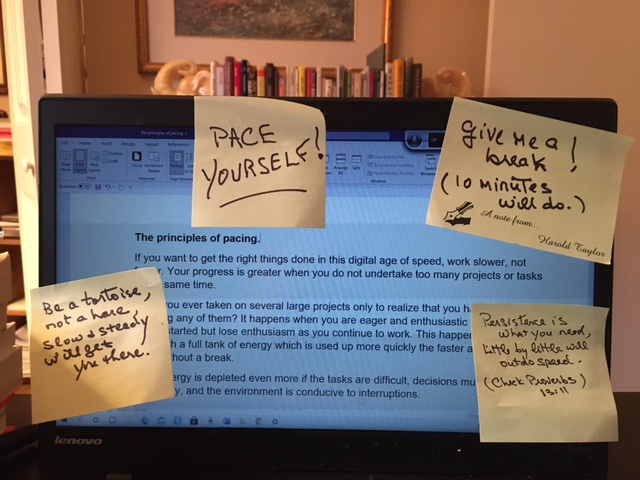If you want to get the right things done in this digital age of speed, work slower, not faster. Your progress is greater when you do not undertake too many projects or tasks at the same time.
Have you ever taken on several large projects only to realize that you have trouble finishing any of them? It happens when you are eager and enthusiastic about getting things started but lose enthusiasm as you continue to work. This happens because you start with a full tank of energy which is used up more quickly the faster and longer you work without a break.
Your energy is depleted even more if the tasks are difficult, decisions must be made frequently, and the environment is conducive to interruptions.
The more lights we connect to a battery, the faster we drain the battery. And it is the same with our personal energy. The more work we do, the faster our pace, and the more frequent the decision making, the faster our tank of energy is depleted.
The more you use your brain the more energy you consume. The brain draws fuel, (oxygen and glucose) from blood delivered through 400 miles of blood vessels. When certain brain areas work hard at something, more blood flows to those regions to help them refuel. They do this by dilating near those spots that need a supply boost. This widening causes blood to reroute.
Whether solving complex problems, continually multitasking, or focusing for hours on the same task, you are depleting your energy resources.
Managing your energy is like increasing gas mileage in your car. If you run the air conditioner with your windows open, exceed the recommended speed limit, drive all night, and periodically drive with your emergency brake engaged, you are going to consume a lot more gas. Similarly, you will burn more energy if you push yourself when you are tired.
An article appearing in the New York Times described the results of this energy drain on a parole board’s decisions. It reported that after examining more than 1100 decisions over the course of a year, it was found that prisoners who appeared before the board early in the morning received parole 70% of the time; but those who appeared late in the day were paroled less than 10% of the time. In at least one incidence two prisoners were serving the same sentence for identical crimes and yet the one appearing at 8:50 a.m. was paroled while the one appearing at 3:30 p.m. was denied. Ruling on case after case throughout the day had caused decision fatigue and warped their judgment. And it can have a similar effect on all of us if we do not manage our energy as well as our time.
Pacing allows us to maintain our energy level by continuously recharging through adequate sleep, breaks, and times of renewal. Our achievements come faster if our work goes slower. Our thinking is clearer, our creativity is greater, and our decisions are better.
You must pace yourself when you work. European experiments have shown that short, three-minute breaks every hour helps rejuvenate people more than two fifteen-minute breaks. And make sure you do not work longer that 90 minutes without taking a break.
Stop making or accepting phone calls, checking e-mail messages, or initiating new work 15 or 20 minutes before you normally leave the office. Use that time to organize the work in progress, your working area, and yourself, prepare for the next day, and make the transition from work to home.
Kenneth Ziegler, author of Getting organized at work, claims that taking work home in your head does not help your job performance as much as it hurts your personal life. Evenings are times for renewal. Relax and get at least 7 hours of sleep a night.
If you are working from home during the pandemic, it is easier to fall into the trap of extending your working hours. Maintain the same degree of structure as though you were in a company office. You might do that by taking a 10-minute walk at quitting time, (the normal commute time) and changing into more casual clothes when you return.


Recent Comments